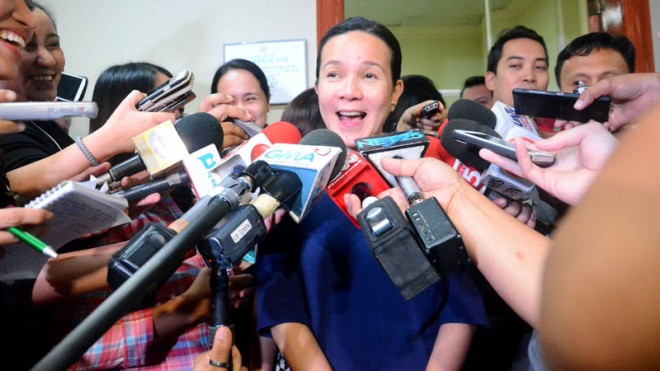The camp of Sen. Grace Poe will seek an immediate dismissal of her disqualification case at the Senate Electoral Tribunal (SET) for fear the case would drag on until the start of the election campaign season in February 2016.
A lawmaker who requested anonymity due to the sensitivity of his information said that Sen. Vicente Sotto III, a member of SET, would ask SET Chair and Supreme Court Associate Justice Antonio Carpio, not to accept the quo warranto case filed by losing 2013 senatorial bet Rizalito David primarily because it was filed way beyond the deadline for filing electoral protest which was 10 days after proclamation.
Poe topped the 2013 senatorial race. She is currently the front-runner for the presidency based on the latest poll surveys.
The source said Poe’s biggest concern was for the SET to “dribble” or unduly stretch the hearings on David’s case questioning Poe’s citizenship and residency.
The source said Carpio had set a five-month period to decide on the case which meant that the SET could hand down its decision as late as February 2016 or just three months before the May elections.
The SET will start its hearing on the Poe case on Friday. Aside from Carpio and Sotto, the members of the SET are Supreme Court Associate Justices Teresita Leonardo-De Castro and Arturo Brion and Sens. Loren Legarda, Paolo Benigno “Bam” Aquino IV, Pia Cayetano, Cynthia Villar and Nancy Binay.
In an interview, 1-BAP party-list Rep. Silvestro Bello Jr. said that members of the SET should inhibit themselves especially if they have a lot of “political capital” at stake in the disqualification of Poe.
Vice President Jejomar Binay, the father of Nancy, stands to benefit if Poe is disqualified by SET.
But NPC Rep. and Isabela Rep. Giorgidi Aggabao said it was up to the “conflicted” SET members to decide whether to inhibit themselves from the case or not.
“Personally I believe that Grace has a strong case, so whether those conflicted inhibits or not, the decision will carry the day for Grace,” Aggabao told reporters in an interview.
Aggabao, a lawyer, said the “threshold” issue in the case was the question of determining the status of a foundling.
“That is a novel issue because there is no legal precedent. What I learned in law school is that foundlings follow the nationality of the place where they were born. There is also an international treaty recognized worldwide,” said Aggabao.
As this developed, the camp of Poe on Wednesday lashed out at her critics for equating the citizenship issues she is facing with her patriotism and love for the Philippines.
“Senator Poe’s patriotism cannot be questioned,” Alexander Poblador, counsel for Poe in the disqualification case filed before the SET, told reporters.
“Those imputing ill motives to Senator Poe and questioning her love of country are totally wrong. They clearly missed the point,” Poblador added.
According to Poblador, it was not a lack of patriotism but Poe’s choice and resolve to uphold marriage and family that compelled her to leave the country and move to the United States.
“Having been born and raised a Filipina and with Filipino values, Poe chose to be with her husband and to raise their children together,” Poblador explained.
Poe married to businessman Teodoro Misael Daniel “Neil” Llamanzares on July 27, 1991. Two days later, they went to the United States and started a family.
Family law expert Katrina Legarda also said it was only natural for Poe to follow the citizenship of her husband and to be where he was.
“It is a requirement of the Family Code that you go where you both agree to go. That’s the requirement of being married,” Legarda said.
It was only 10 years later or on Oct. 18, 2001, when Grace became a US citizen. After her father, movie actor Fernando Poe Jr., died in December 2004, Grace and her family decided to return to the Philippines for good in the first quarter of 2005 to be with her widowed mother, veteran actress Susan Roces.—Gil Cabacungan with Jerome Aning


